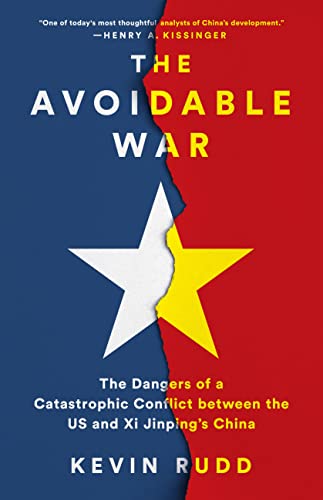
Review of The Avoidable War: The Dangers of a Catastrophic Conflict between the US and Xi Jinping’s China by Kevin Rudd. Public Affairs, 2022.
Kevin Rudd, former Australian prime minister and diplomat, takes pride in being a zhengyou, or honest friend, to both the United States and China. As with others who aspire to this role, the burden of his public truth-telling is imposed mostly upon the former.
There is a “profound sense of difference, mystery, and confusion about what China is about, what it is becoming, and what this may mean for American interests, values, and the future of US global leadership,” he writes. This is not surprising because “Americans have been asked to come to terms with a people, culture, and political system that lies way beyond traditional American frames of reference.”
By contrast, Chinese leader Xi Jinping “is no neophyte in his understanding of America” before conceding mere sentences later that “his understanding of America has always been intermediated through official Chinese sources of translation, which are not always known for accuracy, subtlety, or nuance.” (He also incorrectly states that no American leader has ever spoken or read Chinese. In fact, Herbert Hoover and his wife, Lou, both spoke Mandarin.)
While Rudd is animated by a belief that better American understanding of China would reduce the risk of conflict, the irony is that even Rudd’s strenuously balanced presentation does not diminish the reality of China’s challenge, but adds clarity to it.
In crisp chapters, Rudd articulates the Communist Party’s priorities. Paramount among these is the preservation of its own power and national unity; the deliverance of economic prosperity and sustainable development; the development of a modernized military; and the achievement of regional and global influence. There is value enough in this briefing, but Rudd goes on to articulate ten scenarios for how US-China relations could play out and to propose a framework for “managed strategic competition.” Seven of these scenarios involve conflict, chiefly over Taiwan.
This analysis is less compelling, given the scenarios’ self-contained, set-piece nature. While Rudd rightly acknowledges the possibility of accidental escalation, the legacy of 1989 underscores how a complex confluence of events can be deeply destabilizing. (Indeed, amid economic uncertainty, particularly felt by China’s educated youth, growing anger over the government’s Covid-zero policy, and the heightened tensions of a Party Congress year, it is not at all hard to imagine the death of a former leader again serving as the pretext for mass protest.) Moreover, a China consumed by conflict over Taiwan presents an opportunity for its rivals to press their advantage everywhere from the South China Sea to the Himalayan border. This serves as its own form of deterrence.
But this criticism is secondary to the rightful conclusion that the threat of conflict is real and growing. Rudd implores China and the United States to honor their respective redlines and instead play for time. Each country has reason to believe that its adversary will diminish while its own advantages accumulate.
America can and should position itself to succeed regardless of China’s trajectory; it too needs a structured consensus about its priorities. If the United States focuses solely on defending an unmodernized global order and engineering China’s containment or demise, it will – and ought – to fail. Instead, it must outcompete China in bringing more value into the world, much of which can be achieved by investing in its own domestic growth engine. Likewise, if China abandons the pragmatism that has guided it since Reform and Opening, and governs itself principally on the basis of what constitutes the antithesis of the United States, it will lead itself into ideological traps, as it has with its Covid policy, and it too will fail.
One of the ironies of America and China’s mutual noncomprehension is their struggle to understand the bases of their own strength. America too often aims to inspire the world through its pretensions to leadership, whereas China seeks to on the basis of its governance. In reality, the appeal of each country around the world is often for the opposite reason. China is admired more because it is a self-, and perhaps over-, confident check on American hubris, not for its excesses of infrastructure those outside its borders cannot enjoy. America is admired not for its stridency, but its ability to balance dynamism and stability.
President Biden intuits this in his insistent refrain that America must lead by the power of its example, not the example of its power. America discounts the importance of government to its success; China discounts that of its people.
America should find more ways of challenging the Party and championing China’s people. Consider the surprising appeal the Trump administration’s trade war had among some Chinese. They saw in the administration’s pressure on the Communist Party a defender, albeit unwitting, of the country’s reform and opening. The impact had that been intentional and just one of a suite of policies that recognized the potential for the American and Chinese people to both prosper could have been considerable. A zhengyou of America and China who defined their friendship not with respect to their governments, but their peoples, would recognize that.